Reviews of "Afire," "Blue Jean" and "Roise & Frank" are all in the latest Movies with Meaning post on the web site of The Good Media Network, available by clicking here.
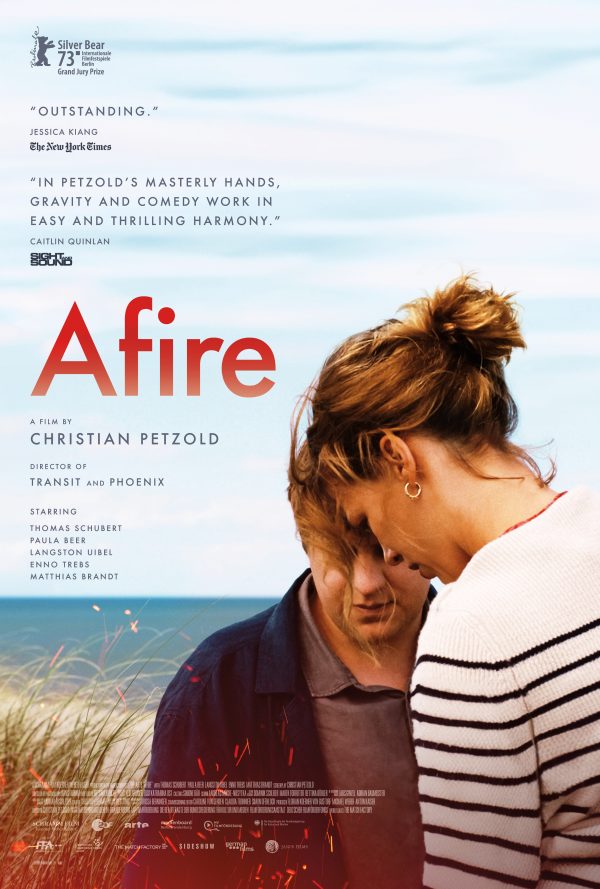
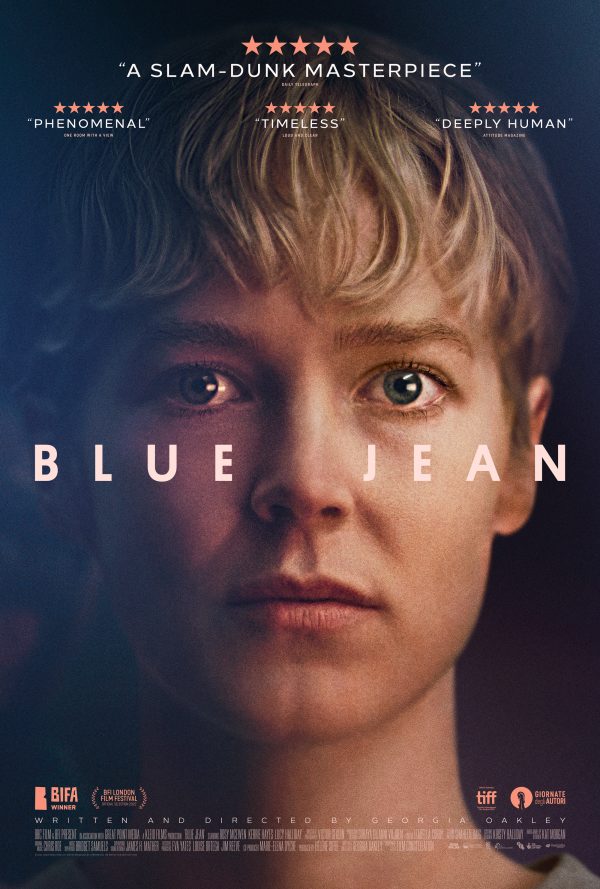
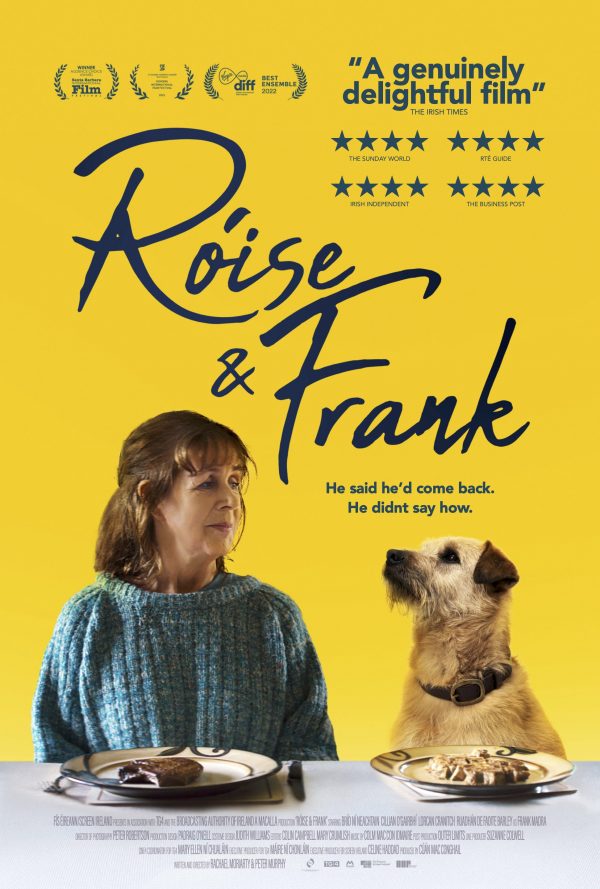

Reviews of "Afire," "Blue Jean" and "Roise & Frank" are all in the latest Movies with Meaning post on the web site of The Good Media Network, available by clicking here.





“Róise & Frank” (2022 production, 2023 release). Cast: Bríd Ní Neachtain, Cillian O’Gairbhi, Lorcan Cranitch, Ruadhán de Faoite, Michelle Beamish, Seán Mac Gearailt, Cormac Hennessy, Aonghus Og McAnally, Barley the dog. Directors: Rachael Moriarity and Peter Murphy. Screenplay: Rachael Moriarity and Peter Murphy. Web site. Trailer.
Róise’s depressed approach to living has others worried, such as her son, Alan (Cillian O’Gairbhi), a physician who struggles to balance the obligations of his career and as a new father while keeping tabs on mom. His patients who know Róise are concerned, too, frequently asking him how she’s doing, given that she’s largely vanished from their lives. That’s especially true for Róise’s neighbor, Donncha (Lorcan Cranitch), whose interest in her involves more than just her well-being now that she’s single again (even though dating and romance are some of the last things on her mind).
But circumstances change suddenly when an unexpected visitor shows up on her doorstep – a scruffy stray (Barley the dog) who seems to take an unusually strong interest in Róise. She’s initially annoyed by the pooch’s persistence in following her around and engaging in less-than-subtle attempts at ingratiating himself in her life. But Róise soon notices some unusual – and more than a little synchronistic – behavior patterns. For example, when the dog barges into the house, he makes a beeline for the easy chair in which Frank often parked himself. On another occasion, the dog intently scours Alan’s former bedroom to search for a ball that he used when he played in hurling matches, a sport that Frank positively loved. But the clincher comes when the dog bolts out of the house one day and heads straight to the cemetery in the local church yard, running directly to Frank’s grave, where he makes himself comfortable until Róise catches up with him.
When Róise puts all the pieces together, she comes to an astonishing conclusion: The dog is the reincarnation of her late husband. In Róise’s view, these unusual occurrences are just too coincidental to be interpreted any other way. But the cemetery incident seals it for her: When she thinks back to the time when Frank was on his death bed, she recalls the last thing he said to her – that, even though he was dying and moving on to a new plane of existence, their lives together were not over, that the relationship would continue, even if it didn’t take the same form that they had long been accustomed to. And, from her perspective, the dog’s sudden appearance and all of the synchronistic events that have since occurred undeniably confirm his final statement. She’s overjoyed at this prospect, one that significantly lifts her spirits. And she’s so convinced that she’s once again in the company of her beloved husband that she even starts calling the dog by his name, Frank.
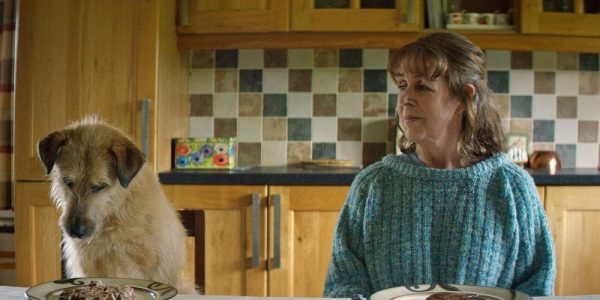
Before long, Róise begins to emerge from her protracted sorrow. Alan, Donncha and others are certainly pleased to see the change in her attitude. She even resumes the activities she abandoned, like rejoining the choral group. She also takes an interest in a young neighbor boy, Mikey (Ruadhán de Faoite), a sweet but somewhat geeky lad who longs to be a star hurler but lacks the skills to do so. However, with Frank’s help as an impromptu trainer, and backed by Róise’s zealous encouragement, Mikey soon develops into quite the talented little athlete, much to his peers’ stunned amazement.
Nevertheless, despite the positive reversal in Róise’s attitude, Alan, Donncha and others are concerned about her state of mind. They’re worried about her unshakable belief that the dog is the second coming of Frank. They can’t help but think that perhaps she’s becoming delusional, particularly given the depth of her conviction. They consider various options to urge her to give up this fantasy, some of which verge on interventional efforts. However, Róise remains steadfast in her beliefs, especially in light of what Frank’s presence has done for her and for Mikey. Frank has been a big help to them both, and she’s not ready to give up on that.
When gentle nudges to encourage Róise to change her mind don’t work, more drastic events begin to unfold to prompt her to abandon her “silly superstition.” Troubling circumstances arise where Frank’s safety, freedom and well-being are threatened, such as attempts by the neighborhood veterinarian to intrusively force Frank into getting chipped to comply with local dog ownership mandates. Given everything that Frank has done for her, Róise can’t help but return the favor, intervening on her partner’s behalf. But, when the two become separated, doubts surface about whether they’ll be reunited, conditions that throw matters into crisis at a time when things in Róise’s life had just begun to see an upturn. Will she and Frank get back together again, or is she doomed to return to the fate from which she just escaped? Or is another option possible? Indeed, Frank’s return was unexpected, so maybe there’s a chance that another such surprise might occur.
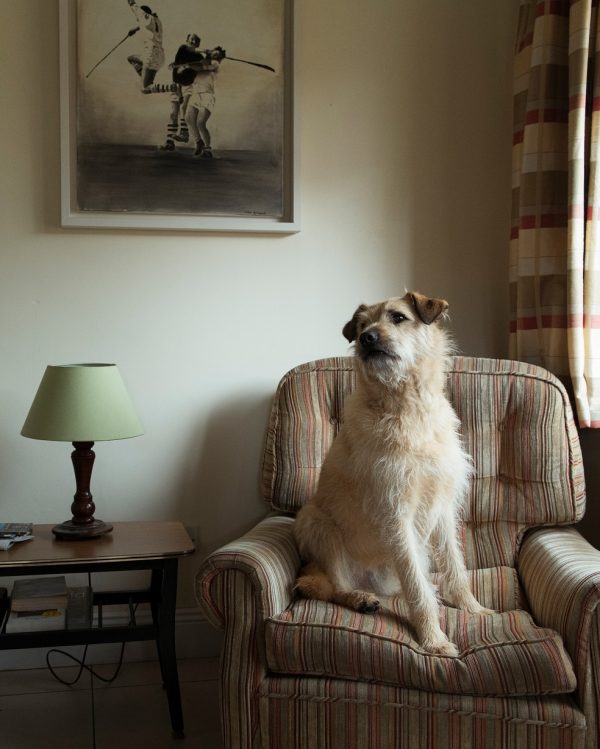
Róise’s conflicted beliefs would thus appear to have her locked into an irreconcilable existential stalemate. Yet, ironically, her beliefs could also provide the solution to extracting her from this problem. By skillfully drawing upon the power of her beliefs, she could deftly use them to resolve this seemingly insurmountable impasse. That’s because our thoughts, beliefs and intents play a central role in the manifestation of the existence we experience thanks to the conscious creation process, the philosophy that maintains these intangible resources are responsible for the materialization of our reality. It’s not clear how familiar Róise is with this school of thought, but, given how her story ultimately unfolds, it’s apparent that she has a reasonable, if not fully understood, grasp of some of its key principles and makes use of them in changing her destiny, even if she’s not entirely aware of doing so or of how to reach her destination.
Róise’s awareness of these notions emerges gradually, in carefully considered steps, through which she systematically puts the pieces together to arrive at a conclusion that falls into line with her most cherished, deeply held beliefs. That conclusion is largely based on her belief in the promise her husband made to her on his death bed – that their relationship was not at an end and would continue, even if not as expected. And, when she sees how that’s been fulfilled with her new house guest’s mystifying arrival, she sees how Frank her husband has indeed kept his word as Frank the dog.
Coming to this realization rests strongly on Róise’s recognition of all of the various components that went into the creation of this scenario. Perhaps the most significant of these is her keen ability to spot the synchronicities that pop up in her world after the dog’s arrival. She recognizes the meaningful significance of them, especially once they begin appearing regularly. She realizes that, collectively, they can’t be realistically chalked up to “coincidence” or random chance. She understands that these occurrences represent messages that are being sent to her so that she can see the larger pattern of which they’re a part. They thus constitute “clues” to help her recognize and understand what’s unfolding before her eyes. And they all point to Frank, be it in his current canine and formerly human incarnations, as part of keeping his promise.
What’s more, she recognizes that these synchronicities represent the fulfillment of her late husband’s promise with precise specificity. When he said that their relationship would continue after his passing, even if in a different form, events have indeed unfolded in line with that pronouncement. The disparity in the nature of Frank’s different incarnations couldn’t be more readily apparent once recognized, first as a man and then later as a dog. To Róise’s credit, she combines this distinctly singular piece of the puzzle with those connected to the numerous other synchronicities she’s been able to recognize, providing further confirmation of her belief in Frank agreeing to one day fulfill his promise. While Róise may have had to endure her share of emotional distress in reaching this point, she can take comfort now that her deeply held belief has been fully realized, even if not in the anticipated iteration.
Appreciating these realizations is important, not just for Róise but for all of us, because they illustrate how our existence is full of clues to help us understand how and why it materializes as it does. They truly are reflections of our beliefs, showing us how these intangible resources come to constitute the components of the reality we experience. More importantly, however, they help to make us aware that we’re the drivers of those beliefs – and, consequently, the nature of the existence around us, no matter what nature it may encompass, for better or worse.

Frank’s return also shows us how the elements of our existence can be helpful in many ways – and to many people – even if they assume an unlikely form. Given what we know about Frank’s human incarnation, he seems like he was a kind and loving person. And, in reincarnating, we see those qualities repeated, even amplified, in canine form. Not only does he help Róise get over her grief, but he’s also a guardian and protector for her when need be. He also extends his helping paw to Mikey, undoubtedly in much the same way he probably did with his son Alan when he was in human form. Now, as a dog, Frank thus plays (or continues to play) the roles of helper, teacher and caregiver, meeting the needs of those who require his assistance and further gaining experience at what his spirit does best, even if from a new perspective, one that’s just as driven by beliefs as when he was in human form.
While a tragedy may have been at the heart of what set this scenario in motion, it nevertheless manages to unfold in fulfilling and satisfying ways for all concerned. All of which goes to show that silver linings lurk where least expected. Uncovering those benefits may call upon us to take a discerning look at our existence, how we arrive at its manifestation and the role we play in that grand process, but doing so provides us with a greater understanding of reality, our place in it, and how we can derive the most from it for our personal and spiritual growth. Who knew that a cute little dog could do so much in helping us learn so much about the fundamental nature of our being.
How refreshing it is to watch a sweet, touching family film without it oozing enough sugary syrup to make even the most hardened stomach nauseous. Such is the case with this warm, loving, heartfelt tale from writer-directors Rachael Moriarity and Peter Murphy, one filled with a series of heart-tugging twists and turns that will positively leave viewers teary-eyed with joy. Despite a few predictable story elements, “Róise & Frank” nevertheless manages to delight in a natural, emotionally grounded way that never seems forced or artificial, thanks to its fine performances, breezy writing, beautiful cinematography of the Irish landscape and affecting original score. This enchanting Gaelic language offering will charm audiences to no end without ever resorting to schmaltz or manipulation, earning every reaction it evokes. Like its adorable four-legged protagonist, this one could indeed leave viewers coming back for more. The film is available for streaming online.
They say there’s no love as great as the kind that comes from a dog. And, given how Frank so freely and readily illustrates this, one can’t help but wonder how many canines like him may, in fact, be the reincarnations of deceased loved ones. Whether or not that’s true, however, we should be grateful for what they give us, no matter how they find their way into our existence. We should give ourselves a well-deserved belly rub or pat on the back for having drawn such devoted four-legged friends into our reality – and be thankful for everything they give us, time after time after time.
Copyright © 2023, by Brent Marchant. All rights reserved.
Tune in for the latest Cinema Scribe segment on Bring Me 2 Life Radio, beginning Tuesday August 22, available by clicking here. You can also catch it later on demand on Spreaker, Spotify, Apple Podcasts, iHeartRadio, Podchaser, Audible, Deezer, Podcast Addict and Jiosaavn.
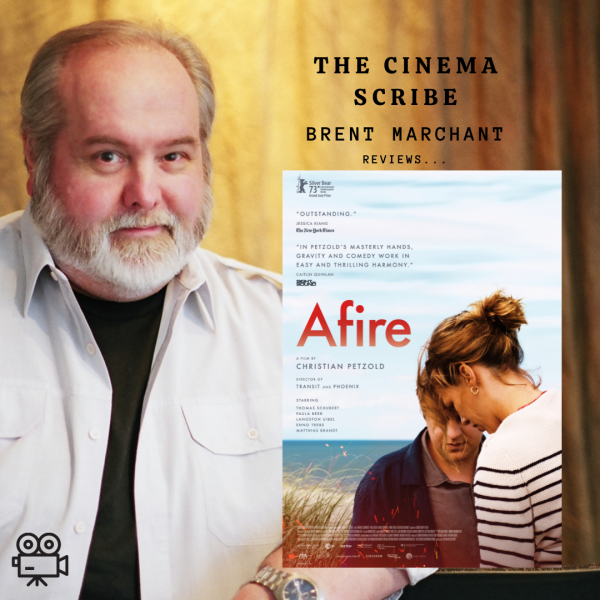

“Blue Jean” (2022 production, 2023 release). Cast: Rosy McEwen, Kerrie Hayes, Lucy Halliday, Lydia Page, Aoife Kennan, Amy Booth-Steel, Stacey Abalogun, Scott Turnbull, Dexter Heads, Lainey Shaw. Director: Georgia Oakley. Screenplay: Georgia Oakley. Web site. Trailer.
These circumstances were difficult to reconcile for many conflicted community members, such as Jean Newman (Rosy McEwen), a fictional phys ed teacher at an English secondary school. The divorced educator started a new life after leaving her husband, exploring her feelings for women and becoming involved in a passionate relationship with Viv (Kerrie Hayes), an outspoken advocate for LGBTQ+ rights. However, despite this blossoming romance, Jean has kept quiet about her status, especially at her job, the type of highly visible position that has become an easy target for those seeking to rein in gay and lesbian individuals, all in hopes that their sanctimonious efforts will curtail the potentially compromising and “promiscuous” behavior of these alleged social deviants. Jean would like to be more open about herself, but she knows that doing so could jeopardize her career, particularly with the Thatcher government’s initiative to pass Section 28, legislation aimed at prohibiting activities openly promoting homosexuality, a bill carrying wide-sweeping implications for the LGBTQ+ community. At the same time, however, laying low is also straining relations with Viv, given that she’s uninhibited about openly being herself – and wishes that Jean would be, too.
Jean is constantly reminded of her circumstances, too. In addition to the challenges of maintaining a low profile at work, she also struggles to do the same in her relations with relatives, such as her sister, Sasha (Aoife Kennan), her brother-in-law, Tim (Scott Turnbull), and her young nephew, Sammy (Dexter Heads). She’s often asked about why she divorced, as well as if there are any new men in her life, questions that she’s increasingly having trouble deflecting. But these issues are nothing compared to what she’s about to face.
When a transfer student arrives at Jean’s school, she has her suspicions about the new pupil. That speculation is soon confirmed when she spots the young woman, Lois (Lucy Halliday), at a gay bar one evening. Even though Lois is clearly under age, she nevertheless manages to pass for being old enough and fits right into the pub’s lively crowd. And, when Lois begins to behave in a flamboyant manner, Jean grows concerned. Despite efforts to maintain her distance, Jean pulls Lois aside and advises her to tone things down, fearing that she’ll become a target for the kind of scorn that’s surfacing more prevalently in British society. In doing this, however, Viv spies Jean’s actions and grows seriously upset. At first, Viv erroneously suspects that Jean is hitting on Lois, a prospect that hurts her feelings. But, when she finds out the real reason behind Jean’s behavior – that she’s actively encouraging Lois to hide her true self – Viv is even more disappointed, given that her partner is openly urging the young woman to deny her true feelings to herself, something that genuinely offends the activist’s sensibilities.
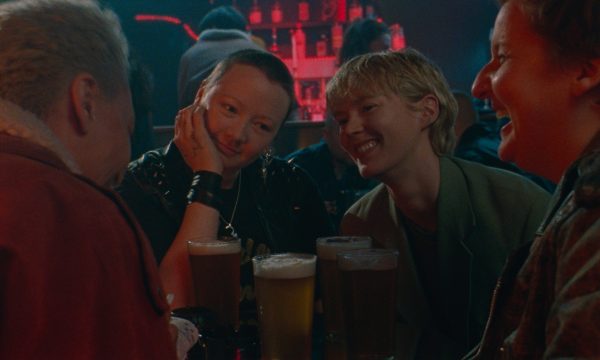
And this is just the beginning. Circumstances get further out of hand at school when Siobhan (Lydia Page), one of Lois’s mean-spirited classmates, skillfully attempts to entrap her in an alleged act of sexual assault in the girls’ locker room, an incident that Jean clandestinely witnesses – and about which she knows the truth. The event subsequently puts Jean in yet another dicey situation: How is she supposed to testify about what she saw when the girls are brought in for questioning by school authorities? She wants to protect Lois, but what is she supposed to say? Should she tell the truth, risking the reputations of both students? Or should she take a “protective” stance similar to what she advocated at the bar several nights before? But, more importantly, what will Jean’s actions in this case say about her strength of character and willingness to be herself? Both options represent potentially perilous paths, but what will she do? But, even more so, what should she do? And what will that mean for the future of her relationship with her family, her partnership with Viv and her employability as a teacher in an increasingly less tolerant society?
Circumstances like these have long hampered the growth and freedom of those in the LGBTQ+ community. That’s been especially true when society’s powerful elements have sought to hold back such individuals with the force of law and social ostracism, regardless of how unscrupulous and patently unfair such practices might be. But, by the 1980s, many of the community’s constituents began to fight back, efforts that brought about some initial reforms. At the same time, though, these efforts also generated a reactionary response among those seeking to preserve the status quo, as evidenced in this story.
Given these conditions, where is one supposed to stand? That all depends on one’s beliefs, and they’re important considering the role they play in the manifestation of one’s existence, a product of the conscious creation process, the philosophy that maintains these intangible resources are responsible for the reality we experience. It’s unclear how many of us are aware of this school of thought, but, in reviewing the evidence with regard to its viability, it becomes fairly clear that there’s an undeniable connection between the two.
This situation, however, poses a particularly powerful conundrum: Considering the forces at work here, what is one supposed to believe? It’s only natural to want to be yourself, but what if acting on that belief could get you fired from your job, disowned by your family, and/or shunned or ridiculed by society? Many would legitimately see those possible outcomes as powerful incentives to intentionally maintain a low profile.
But isn’t such an attitude giving license to a willfully exclusionary and discriminatory practice? Doesn’t it represent a fundamental compromise of one’s values? And doesn’t it undermine whatever progress has been made toward implementing needed reform and equalizing the prevailing circumstances? That’s certainly what many LGBTQ+ activists quietly believed for a long time – and what they were railing against when countermeasures were being effected to reverse the gains that the community had made at the time.
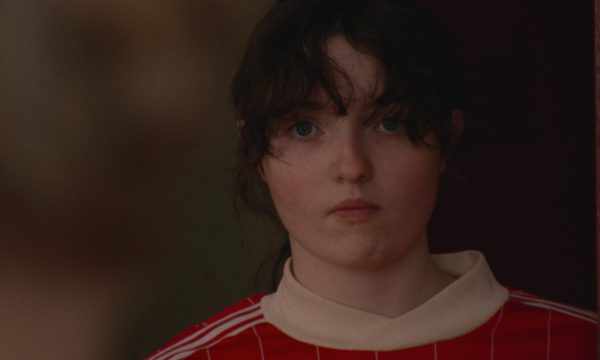
While Jean’s outlook is admittedly understandable, consider the costs of maintaining it. To begin with, it means upholding a fabricated façade that doesn’t represent her true self, putting forth a false reflection of her innate character. Then it carries potentially serious consequences for her relationship with Viv, given that there would be a fundamental disconnect between them and their respective beliefs about their lives and themselves. Keeping up such a front and sustaining a partnership that’s inherently unbalanced takes a lot of work. Is that something Jean could realistically do for the long term? And, even if she could, how happy could she be with such an arrangement? At some point, she’s bound to tire of having to artificially force such beliefs upon herself, and where would that leave her? Indeed, where would she stand in connection with her sense of personal integrity?
Ultimately, scenarios like this come down to a matter of choice when it comes to the beliefs to which we adhere. Granted, the choices involved may indeed be difficult, but we must nevertheless decide what we can live with and what would suit us best. Living a lie is rarely a workable option, something that Jean comes to see in rather short order in light of the fallout she experiences because of her choices. So it’s at that point where she has to ask herself, “Can I do this for the long run?” In cases like this, it often doesn’t take long to see how honesty really is the best policy, particularly when it comes to making decisions for ourselves, our lives and our future.
For the record, despite strong opposition by the UK’s LGBTQ+ community, Section 28 was successfully passed and implemented by the Thatcher government in 1988, forcing many organizations like student support groups to significantly curtail or cease operations at the time. However, with changing fortunes (and beliefs!) in the community and society at large in subsequent years, it was eventually repealed in Scotland in 2000 and in England and Wales in 2003. Overturning the law was a major victory for the LGBTQ+ community, proving that inspired beliefs, backed by zealous actions, can yield noble and noteworthy results. It opened the door for further LGBTQ+ reforms both in the UK and elsewhere. However, this sad chapter in the community’s history also serves as a cautionary tale to those who might be tempted to let their guard down, as evidenced by the emergence of pending anti-gay legislation in a number of US states. The LGBTQ+ community’s belief work must thus remain vigilant to avoid return trips down those outmoded paths, and this film provides a potent reminder of that.
It wasn’t all that long ago when the LGBTQ+ community not only didn’t have legal protections for its rights, but also faced blatant discrimination against its constituents. As “Blue Jean” illustrates, this was true even in supposedly “civilized” and “progressive” societies like those found in North America and Europe. Writer-director Georgia Oakley’s debut feature does a fine (if at times somewhat predictable) job of depicting the effects these conditions had on both the public and personal lives of these individuals, an effort that earned the film a 2022 BAFTA Award nomination for Best Debut by a British Writer, Director or Producer. Admittedly, the picture’s opening act meanders a bit, but, once it gets on track, when the emergence of various damning revelations threatens to blow things wide open, it steadily grows more powerful and heartfelt. These attributes are supported by the fine performances of the cast, solid writing, and its skillfully crafted cinematography and production design, fittingly enhanced by its ubiquitous atmospheric azure tones. It effectively shows us how Jean became so blue – and how we should seek to prevent the same from happening to the rest of us. The film is available for streaming online. Sensitive viewers should be cautioned about some strong sexual content.
Copyright © 2023, by Brent Marchant. All rights reserved.

“Afire” (“Roter Himmel”) (2023). Cast: Thomas Schubert, Paula Beer, Langston Uibel, Enno Trebs, Matthias Brandt. Director: Christian Petzold. Screenplay: Christian Petzold. Web site. Trailer.
Leon seeks to put the finishing touches on his second novel, a book with which he’s rather dissatisfied, an effort that comes up short of his expectations, not to mention the quality of his first title. He’s anxious about wrapping up the project, especially since he senses that his publisher, Helmut (Matthias Brandt), feels the same way he does about the book. Consequently, he dreads what he has to get done before an upcoming meeting with Helmut, a task he’s not sure he can complete on time or in good order. It’s a tremendous source of stress, preoccupying his thoughts and keeping him from thinking about virtually anything else (like enjoying the prospect of spending some time relaxing).
As for Felix, he needs to work on creating a portfolio as part of his art school application. He’s unclear on what he wants to do, and he hasn’t made much progress on assembling it, even though he, like Leon, is facing a looming deadline. Unlike Leon, however, he’s not sweating what he’s up against; he’s confident that he’ll finish the work on time and that it will turn out fine. In the meantime, he remains optimistic and enthusiastic. And, no matter what, he’s not going to let the pressure get the better of him – or spoil his summer vacation.
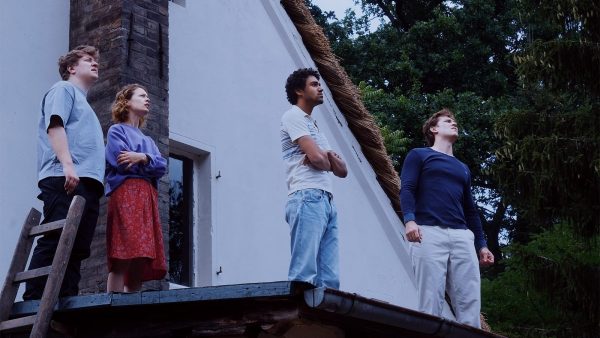
Upon arrival at the vacation house, however, conditions aren’t exactly what Leon and Felix expected. As it turns out, Felix’s mother lost track of the date of their arrival and rented out one of the bedrooms to a young, beautiful, enigmatic woman, Nadja (Paula Beer), a soft-spoken, laconic sort who makes up for this subdued attribute with a series of frequent noisy nighttime visitations.
As one might expect, Leon and Felix each have their own predictable reactions to this surprise house guest. Leon sees Nadja’s presence as annoying and intrusive, an insidious (if somewhat overblown) inconvenience with respect to rooming arrangements, not to mention the overnight sound levels in a small house with thin walls. He also firmly believes that she’ll prove to be a significant disruption to getting his work done. By contrast, Felix finds Nadja delightful and is eager to get to know her, particularly when she introduces him to one of her nighttime visitors, Devid (Enno Trebs), a hunky bisexual lifeguard who Felix is even more anxious to get to know. And, with this eclectic foursome in place, the summer is about to begin.
As the days pass, Nadja, Felix and Devid all become good friends, frequently enjoying one another’s company, while Leon sits on the sidelines and sulks. He rarely and only reluctantly joins in on any group social events, often citing his “need to work” as an excuse for bowing out. The only problem with that is that Leon doesn’t actually do much work, even with his recurring protestations and a supposedly pressing deadline looming. To complicate matters, Leon’s lack of progress on his book is drawn into sharp contrast to the growing number of personal and professional accomplishments of the others, such as the unveiling of Felix’s portfolio idea. Leon’s missing out on a lot of fun, too, with his stick-in-the-mud ways. His attitude keeps getting in the way, most notably where his quietly simmering attraction to Nadja begins to grow, even if these feelings go virtually unexpressed.
Needless to say, the emotional tension in the household mounts as everyone seems to be happy and productive except Leon. And, as this condition steadily escalates, it’s reflected back to the house guests in the nature of their surroundings, most notably the encroachment of a devastating forest fire creeping ever closer to the nearby woods, as evidenced by an ominous nighttime glow in the sky and the increased presence of firefighting helicopters buzzing overhead. Winds off the water have kept the conflagration at bay for some time, but, with the rise in the fiery mood at the vacation house, there’s a corresponding change in the path of the blaze, steering it ever closer toward it.
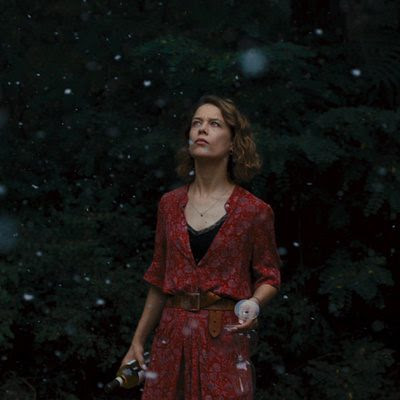
Circumstances reach a fever pitch when Leon musters up the courage to ask Nadja if she’d like to read his novel. She agrees and proceeds to give him her honest evaluation of the book, one that matches his own dismal assessment. That sentiment is, in turn, echoed back shortly thereafter when Helmut visits. He presents Leon with a heavily edited version of the work, one that still reads awkwardly, even after having had a heavy-handed red pencil taken to it. On top of that, during Helmut’s visit, he takes a liking to the other house guests, showering them with compliments on their achievements and hospitality, rendering Leon virtually irrelevant and invisible. Talk about turning up the heat.
With relations in the house strained and the surroundings threatening to go up in flames, the hoped-for summer vacation turns out to be anything but a fun and relaxing time, at least where Leon is concerned. But, with the winds of change poised to sweep over the area, what’s happened so far is only a glimmer of what’s yet to come – and what will emerge out of it.
This requires us to take a good, hard look at our thoughts, beliefs and intents, and that’s important given the roles that they play in the manifestation of our existence, a product of the conscious creation process, the philosophy that maintains these resources underlie the reality we experience. Some of us are no doubt familiar with this thinking, but, for others, it can be a difficult realization to grasp and accept. Nevertheless, if we find that our lives aren’t working in certain respects, we need to look inward to find out why, and this is as good a place as any to start. By scrutinizing our beliefs, rewriting them as necessary and chopping out any burdensome dead wood, we have an opportunity to start over and move in a new direction toward greater satisfaction and fulfillment.
To a certain extent, this is true of all the principal characters in this film, but it’s especially the case for poor Leon. It’s obvious he needs to get down to business in this regard. What’s worse, though, is that he doesn’t even recognize the need for this. He plods along, continuing to do whatever it is that he has apparently been doing for a long time, remaining mired in his relentless funk and never questioning the need or possibility of doing anything different. He’s plainly tired of and dissatisfied with this routine, too, forever sitting back and complaining yet making no effort to shift gears. In fact, as this story plays out, he’d rather procrastinate than take any action to rectify his situation. Talk about a need for intervention.
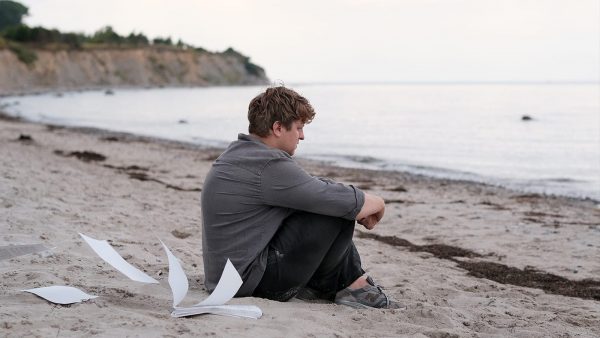
That’s where this summer retreat comes into play. Leon desperately needs to move on from where he’s at (and apparently from where he’s been for a long time). And, on a subconscious level, there’s a part of him that must understand that, as seen in the many elements of his existence that have tried to shake him out of his complacency, no matter how much he’d rather not do so, at least outwardly speaking. Consider the evidence: The people around him approach life from a more joyful standpoint, attitudes he often finds annoying and frivolous; unexpected developments, such as Nadja’s presence and the encroaching forest fire, throw him curves that urge him to implement a more malleable approach toward life and his various pursuits, both personally and professionally; frequent though admittedly exaggerated distractions keep him from getting his work done (or so he thinks), despite the fact that it’s work he really doesn’t want to do in the first place; and the frank criticisms of his book by Helmut and Nadja are less-than-subtle wake-up calls that maybe he should be putting aside his current writing project in favor of something new and different with better literary potential. But the key question in this is, “Does he see things that way (or, perhaps more precisely, does he really want to see things that way)?”
This is particularly true when it comes to how Leon views life in general: Is it meant to be something enjoyed or something endured? In a videotaped interview with writer-director Christian Petzold, the filmmaker states that this is one of the objectives behind this story. So many people, he says, are so preoccupied with work, their careers and their professional achievements that they lose sight of many of the joys that life has to offer (an observation that probably accounts for the inclusion of more humor in this film than in most of Petzold’s previous releases, an attempt to metaphorically lighten things up). Just look at Leon’s case: he’s in a beautiful vacation setting, with ample opportunities for recreation and enjoyment, and in the presence of a possible romantic interest, yet he’d rather play the curmudgeon, ever complaining, missing out on a chance for a good time and spinning his wheels trying to resuscitate a dreadful book that probably can’t be salvaged. Where’s the perspective in all that? Is that life serving him? And, if not, why isn’t he making an effort to change it to something more suitable? The clues for how to improve upon his lot in life are all around him, too, but can he – or will he – see them?
Leon only need look to the examples set by his companions: Felix is thrilled when he finally hits on an idea for his portfolio (especially when he receives a ringing endorsement from Helmut when he shows it to him during his visit). Felix is also ecstatic when his relationship with Devid grows and blossoms, filling them both with tremendous joy. And both Devid and Nadja are content with the summertime jobs they’ve taken, he as a lifeguard and she as a purveyor of ice cream cones to tourists along Ahrenshoop’s waterfront boardwalk. Those may seem like comparatively simple pleasures and ventures, but look at how much happiness they provide. How can Leon top that?
So why isn’t Leon shifting gears? Perhaps it’s because he’s unaware of – or maybe even afraid of – the power of choice available to him. He’d rather surround himself with the familiar than strike out in a new (but potentially scary) direction. But, as circumstances unfold here, he may not be able to fall back on that option for much longer. With conditions changing all around him (conditions that he has unwittingly drawn into his realm of existence), he might soon be forced to adapt to what’s transpiring. He may have long been comfortable with “the devil you know rather than the devil you don’t,” but, as the devil he knows is steadily vanishing, he may soon be forced to deal with a strange new demon, no matter how much he may try to resist it. With the prospect of the slate being swept clean, he might have to contend with bottoming out and losing everything.
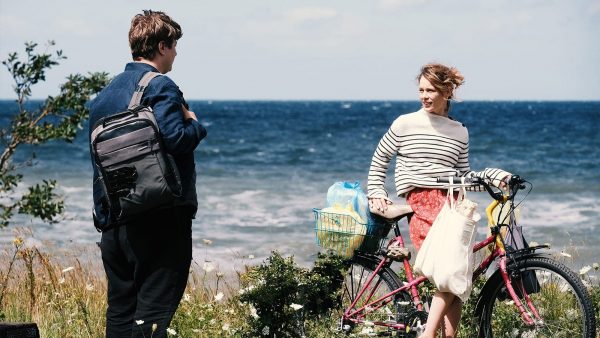
But is that possibility necessarily a bad thing? From both a literal and metaphorical standpoint, fire is a force that can destroy and devastate, but it’s also one that can cleanse, clearing away anything of questionable value to make room for robust, vigorous, valuable new growth. And, sometimes, it can do both simultaneously. Maybe it would be in Leon’s best interests to embrace what’s on its way, to make friends with change and the possibilities it may afford. Such scenarios might involve going out in a blaze of glory while clearing a path to something even grander, enabling us to bask in the glow of something eminently more rewarding. For Leon, that might prevent him from becoming a has-been author doing mediocre work with little fulfillment. Indeed, sometimes it takes burning a supposedly treasured resource to generate some light and heat, but where would we be without those things?
“Afire” is an engaging slowburn in every sense of the word, one that grows progressively more captivating as its enigmatic narrative plays out. The outset may come across as somewhat cryptic, even meandering at times, but the opening act sets the stage for what’s to follow in the back half. The picture subsequently presents a witty but profoundly insightful examination of what makes us who we are, how much we enjoy or endure our lives, and what we can do to make it better for ourselves when we eliminate what no longer serves us. The film’s subdued humor is deceptively gentle, imbued with a quietly biting underlying edge delivered with well-mannered precision and dexterity. That’s particularly apparent during Helmut’s reading of Leon’s reworked manuscript, an excellent example of truly awful but stunningly hilarious writing brought to life. In many respects, this wry offering is probably not what most viewers will expect, but, then, that’s a huge part of its appeal, a refreshing look at life and what we make of it. It’s a valuable exercise given how abruptly it can all be taken away, leaving us to ask ourselves, “What did we do with the time we had, and was it indeed worth it in the end?” Give this one sufficient time to unfold, and let it gradually sink in. It offers a lesson that may help us realize and understand more about ourselves than we can possibly imagine. The film is currently playing theatrically.
When it comes to fire, it can leave us warmed up or seriously burned. The question is, “Which of those options do we wish to embrace?” That all depends on how we view it, which, in turn, is rooted in the beliefs we hold about it. It will leave an impact on us no matter which view we take. In either case, though, the choice is ours – as is what it leaves us with.
Copyright © 2023, by Brent Marchant. All rights reserved.
Tune in for the latest Cinema Scribe segment on Bring Me 2 Life Radio, beginning Tuesday August 8, available by clicking here. You can also catch it later on demand on Spreaker, Spotify, Apple Podcasts, iHeartRadio, Podchaser, Audible, Deezer, Podcast Addict and Jiosaavn.
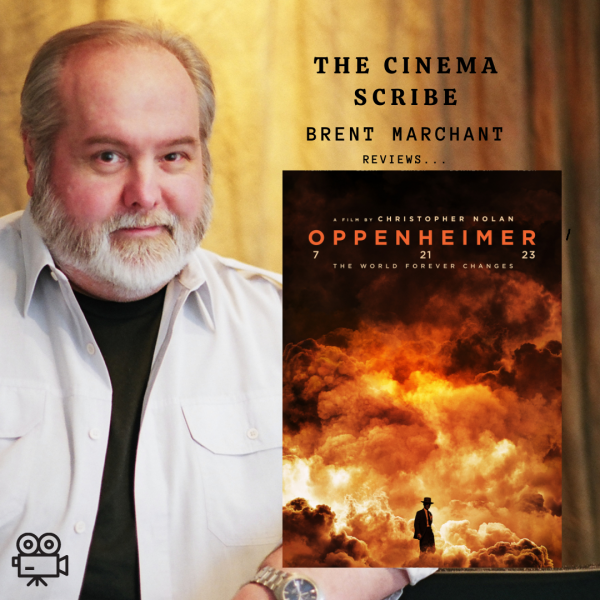
Join yours truly and show host Frankie Picasso for looks at five new films on this month’s movie review edition of the Frankiesense & More video podcast, to begin airing Thursday August 3 at 1 pm ET. Tune in on Facebook or YouTube for all the fun and lively discussion!
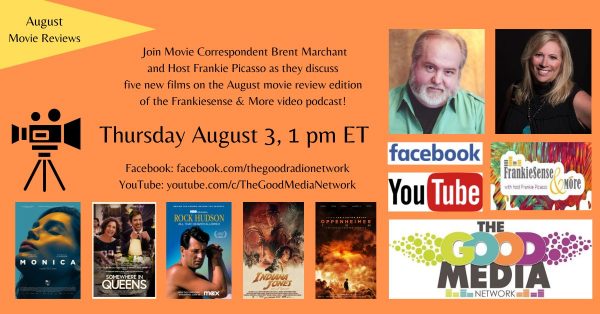
Reviews of "Oppenheimer," "Rock Hudson: All That Heaven Allowed" and "Godland," along with a podcast preview, are all in the latest Movies with Meaning post on the web site of The Good Media Network, available by clicking here.
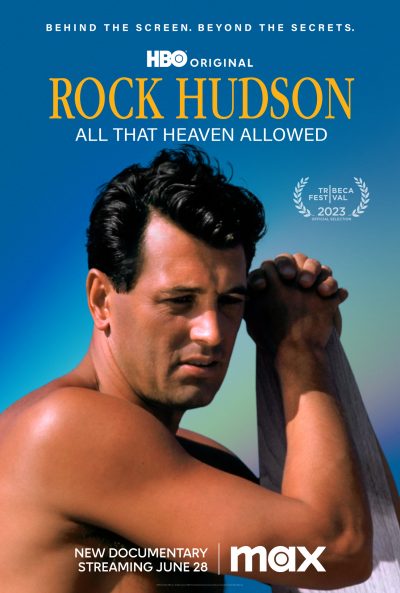
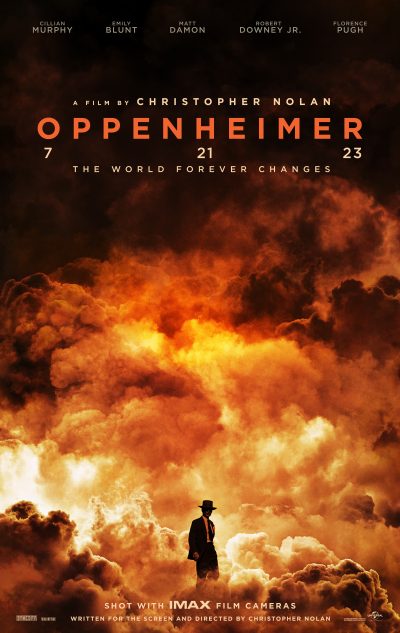
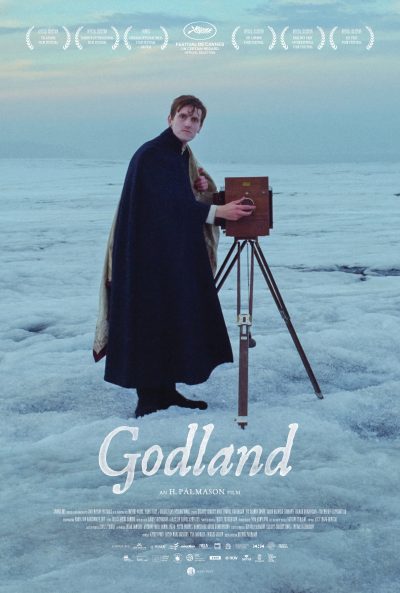



“Godland” (“Vanskabte Land”/“Volada Land”) (2022 production, 2023 release). Cast: Elliott Crosset Hove, Ingvar Sigurðsson, Jacob Hauberg Lohmann, Vic Carmen Sonne, Ida Mekkin Hlynsdóttir, Hilmar Guðjónsson, Waage Sandø, Snæbjörg Guðmundsdóttir, Svanavatns Jökull Darri. Director: Hlynur Pálmason. Screenplay: Hlynur Pálmason. Web site. Trailer.
In the late 19th Century, Father Lucas (Elliott Crosset Hove), a young, idealistic Lutheran minister living in Denmark, is about to embark on a grand undertaking – building a new church in a small colonial community in Iceland, which at the time was under Danish rule. He approaches the assignment with great enthusiasm, looking upon it as a bold adventure, an opportunity for discovery and a chance to practice his hand at his personal passion, photography. He’s heard tales of the wild, untamed Icelandic landscape and its colorful people, both of which he’s eager to see firsthand. In fact, he’s so inspired by the prospect that he passes up the opportunity to sail directly to the community where he’ll be carrying out his mission. Instead, he seeks passage to a remote location on Iceland’s southeastern coast, poised on the opposite side of the island from where he’ll end up. He uses this impromptu port of entry as a jumping off point to cross the vast and diverse expanse of his new homeland so that he can see everything it has to offer while making his way to the stage where he’ll meet his destiny. He sees it as a chance to survey the land, meet the locals and document it all with his camera. Little does he know, however, what he’s in for.
Fr. Lucas soon discovers that the moniker “Godland” is a fitting name for his new home, at least as God is described above. In many ways, the unrestrained nature of the Icelandic landscape is more than he bargained for. As the cleric crosses the island with his translator (Hilmar Guðjónsson) and guide, Ragnar (Ingvar Sigurðsson), he soon finds that the diverse, challenging terrain and environmental conditions test his endurance and resolve. In his experience of nature (i.e., “God”) in its unleashed state, he finds that the wild character of this place is far different from the more genteel way of life that he had grown accustomed to in Denmark. In his arrogance, he also soon learns that life in Iceland can’t be “tamed” in the same way as back home; in Godland, the unconstrained will of the divine can’t be made to bow to man’s whims in the same way as it may be within the civil confines of a lavish parish on the European mainland, sometimes with dramatic or even tragic consequences.
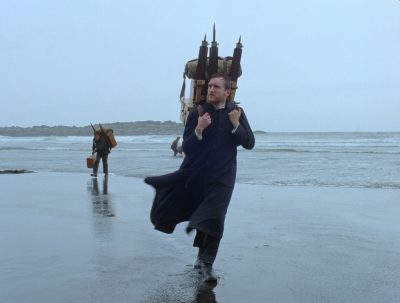
In addition to the environmental conditions, Lucas soon finds that the residents aren’t quite what he expected, either. While some are genuinely friendly, caring and compassionate under trying conditions (especially the women), many of the men are cold, gruff, and not especially sensitive to the preacher’s needs and more worldly outlooks. In large part, this attitude is attributable to the Icelandic way of life, one in which the residents’ resilience and fortitude is frequently tested by the challenges of everyday life. Fr. Lucas also soon learns that the Icelandic natives aren’t particularly fond of being under the thumb of Danish colonialists. They’re reluctant to embrace Danish culture and often deliberately and defiantly speak in their own tongue to keep settlers in the dark as to what they’re saying. Needless to say, it’s not the warm welcome the minister expected.
Crossing the island proves to be more challenging than Lucas ever expected. In fact, by the time he arrives at his destination, he’s in a seriously depleted and sickly state. He’s taken in by one of the settlers, Carl (Jacob Hauberg Lohmann), who lives in a comfortable farmhouse with his two daughters, Anna (Vic Carmen Sonne), an unmarried young woman who serves as a sort of surrogate wife and mother, and Ida (Ida Mekkin Hlynsdóttir), a teen who attends to many of the farm chores and is an aspiring amateur musician. The family attends to the minister’s needs, nursing him back to health so that he can get on with the business of building his church.
But, as Lucas heals and regains his strength, it soon becomes apparent that he’s begun to experience the effects of living in Godland. The preacher’s demeanor begins to change, showing signs of coming under the influence of the wild, untamed nature of the divine in this unrestrained and often-unforgiving land. He’s more prone to giving in to his emotions, something he was once far more reluctant to do. And, as feelings begin to emerge that he’s unaccustomed to, he finds himself torn in terms of trying to understand himself and this new expression of God that has begun to take over his life. It’s something with which he’s obviously uncomfortable, probably because it’s so unfamiliar to him, testing his faith in ways he’s never experienced. He’s unsure how far he should let himself go: Should he hold on to what he knows, or should he give in to this previously unexplored aspect of God that’s apparently an accepted way of existence in Iceland? Indeed, when in Godland, should he do as the Godlanders do? It’s a spiritually evolutionary journey for which he was unprepared, and now he must decide what to do about it.
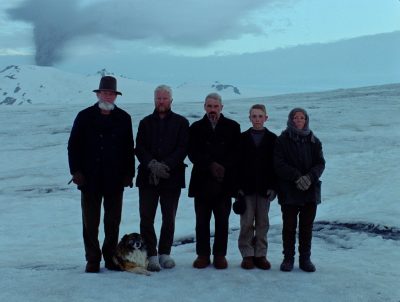
This represents a fundamental distinction in the beliefs held by the locals and the colonists. The Icelanders understand that their God is a wild, untamed force, one filled with an infinite number of possibilities available to it for helping mankind work out its challenges and aspirations. The solutions may not always be easy, as evidenced by the Icelandic way of life, but the residents are confident that things will work out in the end. They have faith in the process. And, by viewing this relationship as a partnership, they see it as a means for cooperation and collaboration.
This is one of the key principles driving the conscious creation process, the philosophy that maintains we draw upon our thoughts, beliefs and intents in conjunction with the power of God/the Universe/All That Is in manifesting the reality we experience. The locals may not be fully conscious of this way of thinking, but it seems that they accept it as an underlying assumption about how life works and how they relate to the divine (and vice versa).
Fr. Lucas and his immigrant countrymen, by contrast, have yet to fully understand and embrace such thinking. And, in their supposed desire to learn more about the outlooks of the locals, they tend to be somewhat dismissive of these “simpler” views. (After all, how could those perspectives be valid for a people who don’t even have churches and other religious trappings to define their spiritual existence?) In that sense, their arrogance and allegedly “superior” mindset prompts them to discreetly look down their noses at the island’s native residents. This becomes apparent, for instance, in one scene when the usually-crusty Ragnar – typically a man of few words, especially those of a personal nature – seeks to confess his failings to Lucas, who pays him little mind and even tries to silence this obviously “inferior” individual.
However, accepting this alternative spiritual view is at the heart of what’s playing out in this story. Fr. Lucas, like many of his fellow colonists, is learning how to view God in this same new light, a cornerstone of his spiritual evolution, one in which the divine is an integral, incorporated element of daily life and not something exclusively reserved for Sunday mornings. It’s about how someone lives his or her life every day, an integration of the divine and the terrestrial in harmony on an ongoing basis.
To fully grasp this, there are several key principles these new disciples need to understand. To begin with, the Universe cooperatively helps make everything possible, for better or worse. The seeds of every conceivable possibility are contained within its makeup, and we have access to all of those resources, without limitation, in determining how things ultimately unfold. What we do with what we’re provided plays an important role in this, given that the divine supplies us with the means to achieve our goals, whether or not we recognize (and embrace) them as such.
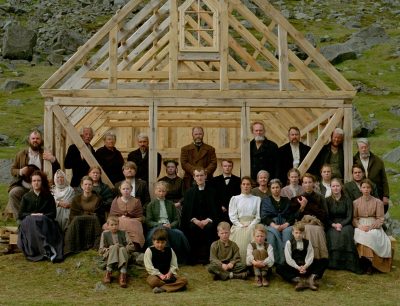
These are key principles for Fr. Lucas to examine. It often proves difficult, however, given that he comes from a “sophisticated” and “civilized” society, one that has grown impressed with itself and its accomplishments, most of which have come to be perceived exclusively as the result of mankind’s own handiwork. In adopting that attitude, however, the minister and his peers have lost sight of how these manifestations actually came into being as divine/human collaborations, a perspective the islanders have retained.
As a result, when things don’t seem to work out, Lucas often tries to force results into existence, often with less-than-satisfying results. This is known as “pushing the Universe,” and it seldom works out as hoped for. In the fulfillment of our ambitions, God (as viewed in Icelandic terms) may appear to have thrown us some curve balls on the way to reaching our destination, developments that might be easily dismissed. However, there may be elements imbedded within those twists and turns aimed at taking us where we want to go – provided we have faith in those notions and are willing to follow through on them to see where they lead us. Human arrogance can indeed thwart the divine’s plans to help bring us what we’ve asked for, and those unwilling to take this to heart may pay a high price for such conceit.
Applying culturally and environmentally based considerations can have a tremendous impact in these situations, too. For example, the differences between Iceland and Denmark in these areas are considerable. In some respects, the Icelanders live lives more tied to their surroundings. In some ways, this has left them more open-minded (and, consequently, somewhat more liberated) than their Danish counterparts in such areas as romantic relationships. As Lucas assimilates into the island culture, he finds himself increasingly drawn to Anna, something he resists as it represents what he believes to be falling prey to the temptations of the flesh, inappropriate behavior for a cleric. Meanwhile, Anna – even though Danish by background – has had some time to fit in and has grown more comfortable with the local culture, including a more relaxed view of romantic matters, even with a supposedly forbidden prospect like a priest. Accordingly, relationships in the Icelandic view are seen as a natural part of life, one of the joyous and wholly acceptable gifts bestowed by the Universe, so why not pursue them when the opportunity arises? Anna thus feels free to engage in something that’s assumed to be perfectly natural while Lucas struggles with the cultural baggage he’s brought along with him from home. This, of course, raises the question, “Does God really want one of His own children to needlessly suffer the pain of loneliness, or does the divine truly want us to experience the joy of love and companionship?” (I’ll go with the Icelandic view on this one.)
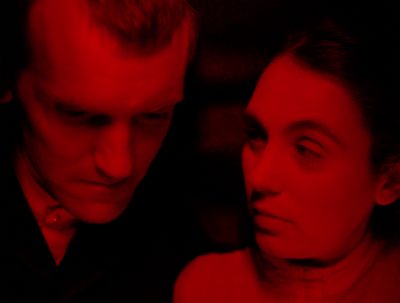
Lucas also needs to understand – as the Icelanders apparently do – that life is meant to be lived in the moment, that the point of power is in the present, not some past that’s already gone or a future that’s yet to arrive. The local residents, for example, realize that it’s fruitless to think about tomorrow when confronted with solving a problem that’s at hand in the present. Worrying about what might happen in the afterlife when faced with figuring out how to traverse a mountain peak or avoid an erupting volcano (with the divine’s guidance, of course) is comparatively trivial when such present challenges arise.
Similarly, it’s important to recognize that the present is a fleeting moment, one that goes almost as quickly as it comes and one that’s impossible to capture forever. Lucas seems to have some difficulty with this, too, as evidenced, somewhat ironically, by his passion for photography. As admirable as this pursuit may be, it needs to be properly tempered. In some ways, his interest in this subject almost seems to be based on the idea of wanting to create an enduring record of the moment, freezing it as if it will somehow last for eternity. But will it? The photo may live on, but the moment won’t, and the distinction between the two needs to be recognized. Again, this is another lesson that Lucas could learn from the locals.
All of the foregoing notions are meant to provide the young minister with an experience of spiritual evolution, learning how to engage in an existence with a practical, accommodating partner, not a remote abstract concept, one that is a wholly integrated part of everyday life. It’s about learning how to let go of human hubris and to become a full-fledged collaborator with the divine that allows us both to come to know ourselves, an equal partner in the grand experiment of reality creation. In essence, it’s all about seeing God in a new light. It would indeed be in Lucas’s best interests if he could come to see the difference between this option and the one he has long known and followed. For my money, if given the choice between a joyful, fulfilling experience and one riddled with limitations and perceived capriciousness, it’s not too hard to figure out which one I’d choose. For his sake, let’s hope Lucas does the same.
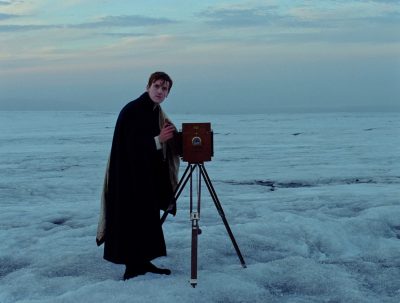
What is God? Is it a reasoned, rational civilized entity or a wild, untamed force full of unbridled power in search of becoming a willing collaborator with us? And, in light of that, then, what kind of relationship are we supposed to have with this elusive divine enigma? That’s one of many unexpected challenges raised in this fact-based story from 19th Century Iceland. Life in a new land composed of unfamiliar elements tests the wits, patience, and, above all, faith of a young, idealistic immigrant cleric as events unfold in unforeseen and potentially disturbing ways. It’s an evolutionary journey for which he’s unprepared and often unable to fathom, prompting him to question much of what he believes and how he conducts himself. The result is a thoughtful meditation on these issues, featuring positively stunning cinematography, fine performances and superb production values. The pacing is surprisingly well balanced, too, especially for a film with a 2:23:00 runtime (though some of the picture’s montages – as beautiful as they are – probably could have been dialed back somewhat without significantly impacting the finished product). Writer-director Hlynur Pálmason’s latest is arguably his best work to date, but be sure to give this one the time that it deserves to develop in order to thoroughly appreciate and enjoy it, both for its sheer beauty and for everything it has to say about the divine and the place it occupies in our lives.
“Godland” has been showered with numerous accolades at various film festivals, receiving multiple awards and nominations in myriad categories. Most notably, the film captured an Un Certain Regard award nomination at the 2022 Cannes Film Festival. In addition, at the 2022 Chicago International Film Festival, this release received the Gold Hugo Award for best feature and the Silver Hugo Award for best cinematography. And, thankfully, even though this offering has primarily played the festival circuit, it’s now available for streaming online.
While our impressions of and relationship with the divine is ultimately a highly personal matter, it’s comforting to know that we have a huge array of options available to us in determining what forms those issues will take. We can follow conventional interpretations that have been prefabricated for us in terms of beliefs, liturgies, dogma and strictures, and that may genuinely be enough for some of us. But, for those who are captivated by the wonder of existence, it’s possible to embrace a limitless view, one in which restrictions have been removed, leaving us to determine for ourselves what best suits our innate sensibilities. Getting to that point often involves a spiritual journey, one that grows and evolves over time but that offers the potential of enhanced satisfaction and fulfillment. That’s something to behold – and something even greater to experience.
Copyright © 2023, by Brent Marchant. All rights reserved.